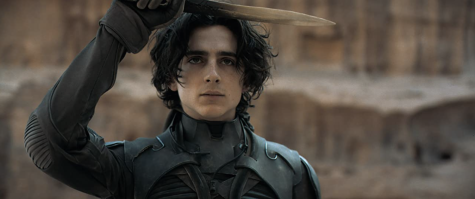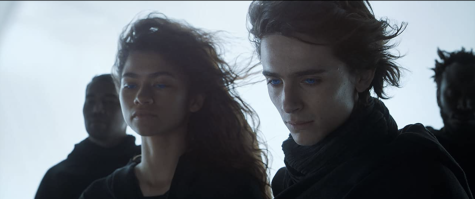REVIEW: ‘Dune’ is an impressive introduction in the context of a larger franchise
With director Denis Villeneuve’s impressive filmography setting the expectations, “Dune” has been one of the most highly anticipated films of the year. The well-loved sci-fi book series is undergoing its second movie adaptation after the initial 1984 version’s flop—this time around, in two parts. It stays true to the narrative of the original series, focusing in on the journey of its messianic protagonist Paul Atreides (Timothée Chalemet).
The decision to divide the story into two parts allows Villeneuve the time to develop the setting, on both a literal and political scale and its characters in a manner similar to epic science fiction novels. Conflict begins with the transference of the desert planet Arrakis to Duke Leto Atreides (Oscar Isaac) from the control of the brutal Harkonnen people. Paul then joins his father and mother, the Lady Jessica (Rebecca Ferguson), on the House Atreides’ mission to the planet to harvest spice, a highly coveted material used in space travel. From there, a political scheme against them unfolds while Paul’s special destiny emerges.

Placing Villeneuve over the project, known best for his sci-fi films “Blade Runner 2049” and “Arrival,” was certainly a smart choice on the part of Warner Bros. The story’s epic scale requires equally epic visuals, which he delivers. Arrakis’ color pallet is limited, but the textures of the sprawling desert and angular city make it a feast for the eyes. Every other setting is styled to reflect the nature of its people. Paul’s visions, as well, are artistically ambiguous, allowing viewers a look into his perspective.
At the same time, the novel’s incredibly complex story is condensed into the simplest terms possible, creating a watchable experience. While centered on Paul in service of his journey, the plot takes time to build up the inciting incidents that start him out on Arrakis. There is little confusion on motivations from the political standpoint, as the obviously feudal model puts forth the usual, but sufficient desire for power. The conflict that results from it is interesting and nuanced in the betrayal that befalls House Atreides. Themes of colonization are also explored throughout in the treatment of the Fremen, Arrakis’ native population.

This clear-cut plot allows the characters to shine. The time Villeneuve takes to highlight each character is one of this movie’s main strengths, held up by a glittering cast that is undoubtedly one of the great draws of “Dune.” Timothée Chalemet is a standout performance as Paul Atreides, presenting the character’s inexperienced yet determined attitude as this franchise’s “chosen one” in a sympathetic light. Rebecca Ferguson also brings a reserve to the Lady Jessica which keeps her character interesting. Zendaya’s role thus far as a member of the Fremen has been slight, but her mystery is in Part Two’s favor. Even supporting roles such as Duncan Idaho (Jason Momoa), Dr. Yueh (Chen Chang), and Dr. Kynes (Sharon Duncan-Brewster) set themselves apart in personality and motivation, each making integral decision that affect the plot. The star-studded cast is one of the smartest decisions for “Dune,” bringing in crowds that would not normally watch science fiction in support of this excellent cast.
Due to the film’s construction, though, both book fans and general audiences alike will unavoidably face a sense of incompletion. As a Part One, “Dune” serves its purpose incredibly well. It introduces the setting, context, and Paul’s significance well. However, many interesting and likely important worldbuilding elements are not brought to full fruition in this first installment.
Paul’s visions make up a great deal of the film story-wise, and their functionality in relation to his destiny is still slightly unclear by the end. His mother’s teachers, the Bene Gesserit, visit for the sole purpose of examining these visions with a confusing payoff. The Reverend Mother’s (Charlotte Rampling) dialogue with Lady Jessica following Paul’s test of endurance sheds light on their goals, but the actual interaction itself seemed lacking in content.

Comparably, there is the mysterious Voice power that Lady Jessica has seemed to pass down to Paul. They use it several times in the film to their advantage, but it is unclear what it is and how it works. While the audience can infer that it is a result of Lady Jessica’s involvement with the Bene Gesserit, it seems underutilized. It is not so much that these elements go unexplained, but unexplored to their fullest potential when they are the source of so much intrigue.
The ending signifies a dramatic shift for the story in Paul’s decision to join the Fremen after killing one of their members in a ritual fight of honor. Besides one other time in the movie, this is the first encounter with the people group outside of his visions. It is clear from those visions that they are an important story element, so placing them late in the film screams of the expectation for a Part Two. Whether it is made will depend on how Part One does at the box office, which has shown promising profits so far. This movie functions more as an introduction than a stand-alone, which is perfectly admirable in the face of the vast scope of novel content. The worldbuilding elements related to Paul’s destiny will likely enter the spotlight in Part Two.
Overall, this version of “Dune” is an excellent introduction to the franchise. It sets up what is to come in a digestible format for general audiences. As someone who has not read the book, I worried going into the film that I would be unable to understand it, but Villeneuve artfully maneuvers through the subject matter. Taking the time to establish the worldbuilding allows this film less confusion and greater appreciation that runs parallel to its original format. That is not to say it stands the best on its own, but with the possibility of a Part Two to look forward to, this is an exciting adaptation.








